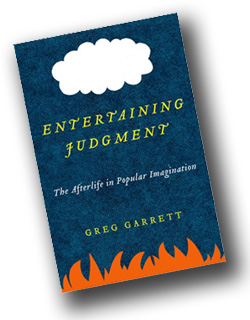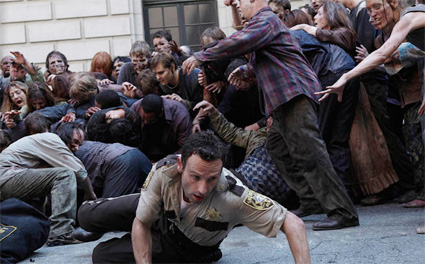Many find meaning in vampire and zombie tales, Baylor prof says
WACO—Many movies, books and television shows fixate on life after death, because increasingly secular American society needs them, Baylor University scholar Greg Garrett said.
“For many of us, if we don’t tell these stories about the afterlife, then there’s a lot about this life that doesn’t make sense,” said Garrett, a professor of English who teaches courses in fiction and screenwriting at Baylor.
 Greg GarrettGarrett holds a doctorate in English from Oklahoma State University and a master of divinity from the Episcopal Seminary of the Southwest in Austin. He has written numerous short stories and books—including critically acclaimed novels—and various scholarly articles.
Greg GarrettGarrett holds a doctorate in English from Oklahoma State University and a master of divinity from the Episcopal Seminary of the Southwest in Austin. He has written numerous short stories and books—including critically acclaimed novels—and various scholarly articles.
Lately, Garrett has combined all those skills and interests with another set of specialties—Christian spirituality, homiletics theology, film and popular culture.
One product of that mix of academic and spiritual interests is Entertaining Judgment: The Afterlife in Popular Imagination, published in January by Oxford University Press.
Garrett has been struck by the steady decline on the one hand of religious adherence in the United States and other Western nations, and on the other by increasing fascination with the afterlife.
Many nonreligious people, he observed, are asking the same nature-of-being questions human beings always have pondered: “Does the cosmos care about me or is it indifferent? Is there justice and mercy? Is anyone looking out for us?”
 Even if the answer is no, there may be comfort for some who believe they must set out on their own course and make their own meaning, he said.
Even if the answer is no, there may be comfort for some who believe they must set out on their own course and make their own meaning, he said.
But many others, while rejecting organized religions, still believe there is meaning and purpose to life and the universe. They also believe in an afterlife, Garrett noted.
And that, he added, may explain the huge popularity of novels and films that deal with vampires, zombies and other supernatural figures and themes.
Novels, movies and TV shows such as Twilight, Harry Potter and The Walking Dead reveal a cultural yearning for—if not belief in—an afterlife and transcendent purpose to life.
The immensely popular Twilight series presented readers and viewers with a cast of human and undead characters caught in moral and romantic dilemmas.
Zombies present viewers with an array of possible meanings, from dark concepts of life after civilization to warnings against our own natures.
“If we are not careful, we can become too much like zombies,” Garrett said. “We will just mindlessly consume, eating to eat again.”
These genres are “serving a lot of needs” for viewers and readers who are outside traditional faith communities.
“People are making meaning and understanding their lives—maybe not consciously—but being formed in some powerful way,” Garrett said.
 The AMC television series The Walking Dead – about life after a “zombie apocalypse” – examines issues of the afterlife and what it means to be human. (AMC.com Photo: Scott Garfield / TWD Productions)But it’s not just people with no religious affiliation whose beliefs, hopes and fears about life after death are being worked out in popular books and films. The “spiritual tourism” literary genre features sacred or everyday people who ascend to heaven or other realms.
The AMC television series The Walking Dead – about life after a “zombie apocalypse” – examines issues of the afterlife and what it means to be human. (AMC.com Photo: Scott Garfield / TWD Productions)But it’s not just people with no religious affiliation whose beliefs, hopes and fears about life after death are being worked out in popular books and films. The “spiritual tourism” literary genre features sacred or everyday people who ascend to heaven or other realms.
The bestselling The Boy Who Came Back from Heaven offered a recent example. In it, Alex Malarkey recounts his death and subsequent visit to heaven. While the story turned out to be a hoax, its popularity among individuals and church groups displayed a yearning for more beyond this life.
“Prevailing stories about heaven” communicate the hope “that there is something better, some sort of recompense for our suffering,” Garrett said. “It’s a fairly universal, human thing that when people have a transcendent vision, they want to tell the world about it.”
Garrett believes churches could use information from research and books like his to connect with many who are unchurched. Popular novels and films can tip churches off about the spiritual concerns of those who are unaffiliated. That, in turn, can help Christians connect with the faith.
“The ability to recognize the connections and explore those connections can be a powerful tool of evangelism,” he said.